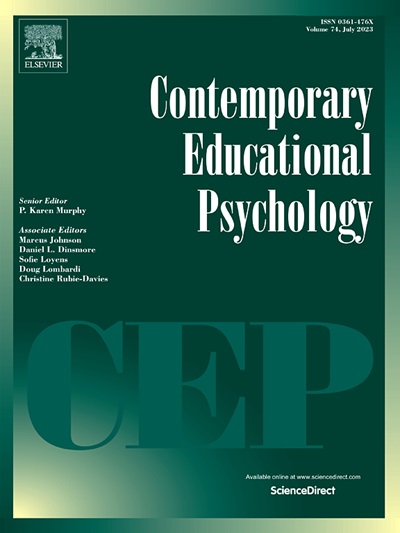跨性别与非二元性大学生数学动机与归属感
IF 3.8
1区 心理学
Q1 PSYCHOLOGY, EDUCATIONAL
引用次数: 0
摘要
关于数学教育中性别相关影响的广泛心理学研究集中在顺性别女性和男性身上,而排除了跨性别和非二元性别个体。然而,只关注顺性学习者的研究往往不能充分捕捉非二元性和跨性别个体的教育经验。在本研究中,我们应用(1)情境期望值理论(Eccles & Wigfield, 2020)和(2)学校归属的社会生态框架(Allen et al., 2016)来研究跨性别和非二元性别大学生在高等数学课程中的经历。在一项家长研究中,采用大学数学信念和归属感调查(Sidney et al., 2024)对数学目标、轨迹、动机信念和归属感进行了测量。对N = 38名非二元性和/或跨性别学生的反应进行了调查。在我们的样本中,跨性别和非二元性别的学生都认为数学很有用,他们对自己使用数学的能力很有信心,尽管他们对是否喜欢数学的看法不太一致。此外,跨性别和非二元性别的学生感觉与同龄人有很好的联系,并且能够与他们一起工作,但他们对更广泛的数学社区的归属感较低。科学、技术、工程和数学(STEM)方向的学生报告了更高的数学动机和更强的归属感。本研究作为一项假设生成的探索性研究,我们描述和探索了性别多样化的数学学生体验,为未来的研究奠定了基础,以建立一个全面的文献,说明更广泛的数学学习体验,考虑到数学设置中的性别社会化。本文章由计算机程序翻译,如有差异,请以英文原文为准。
Mathematics motivation and sense of belonging among transgender and nonbinary college students
An extensive body of psychological research on gender-related influences in mathematics education has focused on cisgender women and men, while excluding transgender and nonbinary individuals. However, research focused solely on cisgender learners often fails to adequately capture the educational experiences of nonbinary and transgender individuals. In this study, we apply (1) the situated expectancy-value theory (Eccles & Wigfield, 2020) and (2) the socio-ecological framework of school belonging (Allen et al., 2016), to examine the experiences of transgender and nonbinary college students in postsecondary mathematics courses. Mathematics goals, trajectories, motivational beliefs, and sense of belonging were measured with the College Mathematics Beliefs and Belonging survey (Sidney et al., 2024) in a parent study. Responses from a subset of N = 38 students identifying as nonbinary and/or transgender were examined. The transgender and nonbinary students in our sample agreed that mathematics is useful and that they feel confident in their ability to use mathematics, though there was less agreement about whether they enjoy mathematics. Furthermore, transgender and nonbinary students felt well connected to, and able to work with, their peers but reported a low sense of belonging to a broader mathematics community. Students on a science, technology, engineering, and mathematics (STEM) trajectory reported higher mathematics motivation and a stronger sense of belonging. The present work serves as a hypothesis-generating, exploratory study in which we described and explored gender-diverse student experiences in mathematics to set the stage for future research in building a comprehensive literature that accounts for a broader set of math-learning experiences, considering gender socialization in mathematics settings.
求助全文
通过发布文献求助,成功后即可免费获取论文全文。
去求助
来源期刊

Contemporary Educational Psychology
PSYCHOLOGY, EDUCATIONAL-
CiteScore
16.50
自引率
3.90%
发文量
74
期刊介绍:
Contemporary Educational Psychology is a scholarly journal that publishes empirical research from various parts of the world. The research aims to substantially advance, extend, or re-envision the ongoing discourse in educational psychology research and practice. To be considered for publication, manuscripts must be well-grounded in a comprehensive theoretical and empirical framework. This framework should raise critical and timely questions that educational psychology currently faces. Additionally, the questions asked should be closely related to the chosen methodological approach, and the authors should provide actionable implications for education research and practice. The journal seeks to publish manuscripts that offer cutting-edge theoretical and methodological perspectives on critical and timely education questions.
The journal is abstracted and indexed in various databases, including Contents Pages in Education, Australian Educational Index, Current Contents, EBSCOhost, Education Index, ERA, PsycINFO, Sociology of Education Abstracts, PubMed/Medline, BIOSIS Previews, and others.
 求助内容:
求助内容: 应助结果提醒方式:
应助结果提醒方式:


